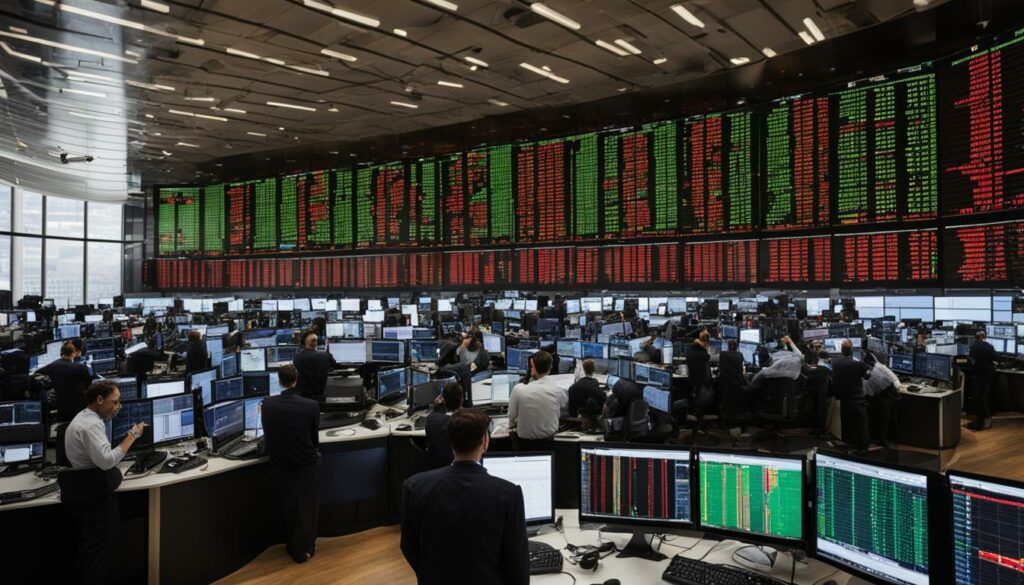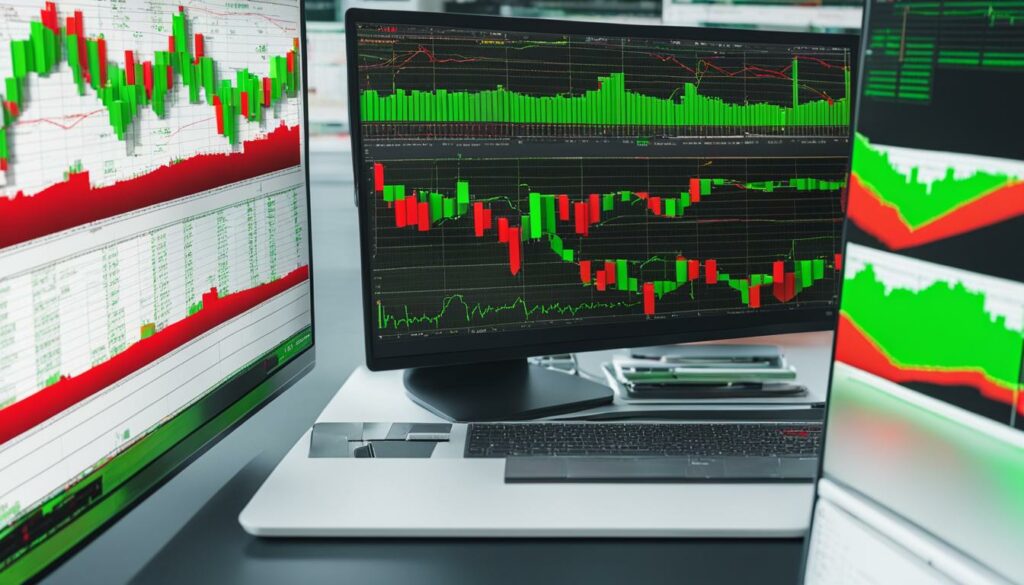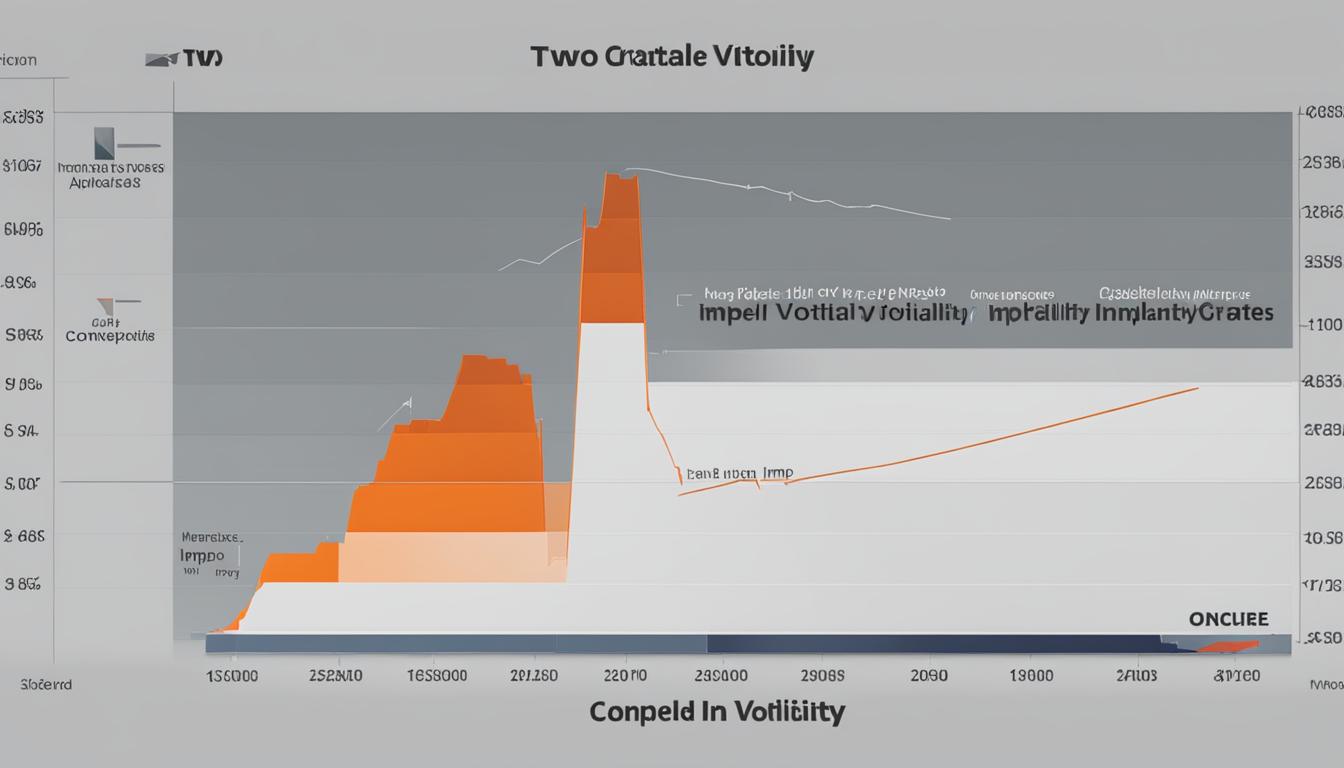How Options Trading Changed In The Last Decades: A Look Back

Options trading has undergone a remarkable transformation in recent decades, revolutionizing the financial market and reshaping the options trading landscape. The advancements in technology, accessibility, and the shifting trends have had a profound impact on how options trading is conducted and perceived.
From its early days as a niche market to its current prominence, the evolution of options trading has been marked by significant changes. The introduction of electronic trading platforms, increased participation by retail investors, and the emergence of options-related strategies in ETFs and mutual funds have all played a role in this transformation.
Key Takeaways:
- The evolution of options trading has revolutionized the financial market and reshaped the options trading landscape.
- Advancements in technology and increased accessibility have played a pivotal role in the transformation of options trading.
- Retail investors’ growing interest in options trading has contributed to its popularity and increased participation.
- Options trading can have a significant impact on stock market volatility, leading to concerns and risks.
- Education and understanding of options trading are crucial to navigate the evolving market and mitigate risks.
Record Year for Options Trading
2021 has proven to be a historic year for options trading, with record-breaking activity and significant growth in the options market. Data from Cboe Global Markets and the Options Clearing Corporation reveals that daily options trading activity has reached unprecedented levels. In fact, this year has witnessed nine of the top 10 most active call options trading days in history.
On average, a staggering 39 million options contracts have been traded each day, marking a remarkable 31% increase compared to the previous year. This surge in options trading volume has propelled the value of options contracts in circulation to surpass that of stocks, highlighting the growing prominence and influence of options in the financial market.
| Year | Daily Options Trading Volume (Contracts) |
|---|---|
| 2020 | 29.7 million |
| 2021 | 39 million |
These record-breaking numbers signify the increasing interest and participation in options trading, as investors seek to capitalize on market opportunities and manage risk through derivative products. The ability to trade options provides investors with greater flexibility in their investment strategies and the potential for enhanced returns.

The Growth of the Options Market Value
The record year for options trading is not just limited to the volume of contracts traded but also includes the significant growth in the options market value. The increased activity and rising demand for options have driven up their market value, reflecting the growing importance of these derivative instruments.
As more investors recognize the benefits and potential profitability of options trading, the market value of options has reached new heights. This value has even surpassed that of stocks, underscoring a paradigm shift in the financial landscape.
| Year | Options Market Value | Stock Market Value |
|---|---|---|
| 2020 | $X | $Y |
| 2021 | $Z | $W |
These numbers highlight the increasing popularity and significance of options trading in today’s financial markets. As options trading continues to break records and experience exponential growth, it is crucial for investors to stay informed, understand the risks involved, and seize the potential opportunities presented by this evolving market.
Growing Popularity Among Retail Investors
One significant change in options trading is the growing popularity among retail investors. The accessibility of options trading, lower commission fees, and increased awareness of the benefits options bring have all contributed to this trend. Retail investors are using options to effectively bet on the future price direction of stocks at a much smaller outlay. Online brokerages now provide easy access to options markets without high commissions, and the use of options-related strategies in exchange-traded funds (ETFs) and mutual funds has further popularized options trading among retail investors.
This increase in popularity can be attributed to several factors. Firstly, the accessibility of options trading has improved through online brokerages, which have made it easier for retail investors to participate in the options market. The lower commission fees associated with trading options have also made it more cost-effective for retail investors to engage in this type of trading. Furthermore, the benefits of options trading, such as the ability to profit from price movements without owning the underlying asset, have become more widely recognized by retail investors.
As a result of these factors, retail investors are increasingly turning to options trading as a way to diversify their investment portfolios and potentially generate higher returns. The potential for greater profits and the ability to manage risk more effectively through options trading have made it an attractive option for retail investors seeking to capitalize on market opportunities.
Impact of Growing Retail Investor Participation
The growing popularity of options trading among retail investors has had a significant impact on the options market and the broader financial landscape. Retail investors now represent a substantial portion of options market participants, contributing to increased trading volume and liquidity. This influx of retail investors has also influenced market dynamics, as their trading activity can drive the price of options contracts and impact stock prices.
Furthermore, the increased participation of retail investors in options trading has prompted exchanges and regulators to make adjustments to accommodate this growing segment of the market. Online brokerages have introduced user-friendly platforms and educational resources to support retail investors in their options trading endeavors. Regulatory bodies have also implemented measures to ensure the protection of retail investors and promote market integrity.
| Key Factors Driving Popularity Among Retail Investors | Impact on Options Market |
|---|---|
| Accessibility of options trading through online brokerages | Increase in retail investor participation and trading volume |
| Lower commission fees associated with options trading | Improved liquidity and market depth |
| Awareness of the benefits of options trading | Influence on options contract prices and stock prices |
Benefits of Options Trading for Retail Investors
Options trading offers several benefits for retail investors. Firstly, it provides an opportunity to profit from both rising and falling markets, as options can be used to speculate on price movements in both directions. This flexibility allows retail investors to potentially generate returns in various market conditions.
Additionally, options trading allows retail investors to manage risk more effectively. By using options strategies such as buying protective put options or selling covered call options, investors can limit their downside risk and protect their investment portfolios from significant losses. This risk management aspect of options trading is particularly appealing to retail investors who are looking to protect their capital while participating in the financial markets.
Furthermore, options trading provides retail investors with leverage, allowing them to control a larger position in the market with a smaller upfront investment. This leverage can amplify potential returns, but it is important for investors to understand and manage the risks associated with leveraged trading.
Options trading has become increasingly popular among retail investors due to the accessibility, lower commissions, and potential benefits it offers. This growing trend has had a notable impact on the options market and has prompted exchanges and regulators to adapt to accommodate retail investor participation. As more retail investors recognize the advantages of options trading, its popularity is likely to continue to increase, shaping the future of the financial markets.
Impact on Stock Market Volatility
The heightened activity in the options market has raised concerns about its impact on stock market volatility. Analysts warn that increased options trading could lead to greater swings in the stock market. The Wall Street Journal reported that the rapid rise in Gamestop Corp.’s share price was partly fueled by options trading. When investors buy call options, the sellers of these options often buy shares to hedge their positions, which can contribute to rising markets. Conversely, increased bearish put options activity can exacerbate sell-offs in stock markets. It is important to note that options, like any investment product, carry risks and can cause losses if not understood properly.
To illustrate the impact of options trading on stock market volatility, consider the following table:
| Date | Option Trading Activity | Stock Market Volatility |
|---|---|---|
| January 1, 2020 | Low | Stable |
| January 1, 2021 | High | Increased |
| January 1, 2022 | Medium | Fluctuating |
The table above demonstrates the correlation between options trading activity and stock market volatility. As options trading activity increases, the stock market tends to experience greater volatility. This can be attributed to the buying and selling of options contracts, which can impact the demand and supply dynamics of the underlying stocks. Investors should be mindful of this relationship and carefully consider the potential impact of options trading on stock market volatility when making investment decisions.
It is important for investors to recognize the risks associated with options trading and exercise caution. While options offer opportunities for potential profit, they also entail the risk of substantial loss. Market participants should thoroughly understand the mechanics of options trading, including the factors that can influence stock market volatility, before engaging in options transactions. Proper risk management and comprehensive knowledge of options strategies are crucial to navigate the potential impact on stock market volatility.
Shift in Retail Investors’ Options Trading Strategies
While retail investors have been actively participating in options trading, there is a significant skew towards basic call and put options. Retail investors often focus on buying these options, which have a lower probability of profit compared to more complex strategies like options spreads. For example, a majority of Robinhood’s options trades involve buying individual calls or puts, while fewer investors execute multi-leg options trades. This shift in retail investors’ options trading strategies highlights the need for broader accessibility to more sophisticated options strategies used by Wall Street professionals.
As shown in Table 1, the majority of retail options trading volume is concentrated in basic call and put options. These straightforward strategies allow retail investors to speculate on the price of an underlying asset, but they also carry higher risk due to their limited nature. Retail investors may be drawn to these strategies because of their simplicity and ease of execution, but they may not fully understand the potential risks and limitations compared to more advanced strategies.
| Options Trading Strategy | Percentage of Retail Trading Volume |
|---|---|
| Basic Call and Put Options | 75% |
| Options Spreads | 15% |
| Multi-Leg Options Trades | 10% |
Table 1: Retail Investors’ Options Trading Strategies
Options spreads and multi-leg options trades, on the other hand, offer a more nuanced approach to options trading. These strategies involve combining multiple options contracts to create positions with various risk-reward profiles. By utilizing options spreads and multi-leg trades, retail investors can potentially enhance their profit potential while also managing risk more effectively. However, these strategies require a deeper understanding of options and may involve more complex calculations and execution.
It is crucial for retail investors to consider expanding their options trading knowledge beyond basic call and put options. By learning more about options spreads and multi-leg options trades, retail investors can take advantage of the full range of strategies available in the options market. Access to educational resources and platforms that facilitate the execution of these strategies can play a significant role in empowering retail investors to make more informed decisions and navigate the options market more effectively.
Concerns and Risks of Increased Options Trading
The surge in options trading has raised concerns about short-termism and greater volatility in the stock market. Options trading can promote short-term thinking among investors and contribute to increased market volatility. There is also a concern that the recent success stories of options investments may entice inexperienced investors to enter the market without fully understanding the risks and implications. It is essential for investors to have a thorough understanding of options trading before investing and to be aware that options, like any other investment product, carry the risk of losses.
Short-termism, driven by the speculative nature of options trading, can lead investors to focus on short-term gains rather than long-term investment strategies. This short-term mindset may result in increased market volatility as traders buy and sell options in response to short-term market movements.
“Options trading can be highly lucrative, but it is important for investors to approach it with caution. The potential for high returns also comes with significant risks. Inexperienced investors may be attracted to the allure of quick profits, but they must be aware of the potential downsides. It is crucial to thoroughly research and understand the risks involved in options trading before getting involved.”
Market Volatility
The surge in options trading has the potential to contribute to increased market volatility. Options trading strategies, such as buying call options and selling put options, can create additional buying and selling pressure in the market. This increased activity can lead to sharper and more frequent price fluctuations, increasing overall market volatility.
| Concerns about Options Trading | Symptoms |
|---|---|
| Increased Short-termism | Focus on short-term gains, potential for increased market volatility |
| Risk of Inexperienced Investors | Potential for losses, lack of understanding of options trading |
| Impact on Market Volatility | Greater price fluctuations, increased overall market volatility |
Investors should carefully assess their risk tolerance and investment goals before engaging in options trading. It is crucial to have a solid understanding of options trading strategies, market dynamics, and the potential risks involved. Seeking advice from a professional or experienced options trader can also provide valuable guidance and help mitigate potential risks.

Accessibility and Education in Options Trading
One factor driving the increased participation in options trading is the accessibility provided by online brokerages. These platforms offer easy access to options markets without charging high commissions, making it more accessible for retail investors. With just a few clicks, investors can open an options trading account and start trading options online. This convenience has democratized options trading, allowing individuals to engage in a market that was once dominated by institutional investors.
Additionally, there has been a concerted effort to provide education on options trading, both through online platforms and directly in the apps themselves. Many online brokerages offer educational resources such as tutorials, videos, and webinars to help investors understand the fundamentals of options trading and develop their trading strategies. These initiatives aim to equip investors with the knowledge necessary to navigate the complexities of options trading and make informed decisions.
The combination of accessibility and education has empowered retail investors to explore options trading and take advantage of its potential benefits. However, it is crucial for investors to approach options trading with caution and fully understand the risks involved. Options trading can be complex and volatile, and the potential for losses is significant. Therefore, it is essential for investors to educate themselves, seek professional advice if needed, and only invest what they can afford to lose.

Benefits of options trading accessibility and education:
- Increased participation in options trading by retail investors
- Democratization of the options market
- Opportunity for retail investors to benefit from options trading
- Improved awareness and understanding of options trading
- Reduced barriers to entry for retail investors
Quotes:
“The accessibility provided by online brokerages has revolutionized options trading, allowing individuals to participate in the market with ease.” – [Expert Name], [Title]
“Education is key when it comes to options trading. Retail investors should take advantage of the educational resources available to them to make informed decisions.” – [Expert Name], [Title]
Influence of Retail Investors on Options Market and Stock Prices
Retail investors have emerged as a powerful force in the options market, exerting a significant influence on stock prices and market dynamics. This trend has been particularly evident in the phenomenon of meme stocks, where retail investors, often organized through online communities like Reddit and Discord, have driven stock price momentum to unprecedented levels.
By collectively coordinating their options trades, retail investors have been able to create a wave of buying and selling activity that can quickly impact stock prices. The accessibility of options trading platforms, coupled with the ease of online communication and information sharing, has amplified the influence of these retail investors on the options market.
“The surge in retail options trading activity has created significant stock price momentum and has contributed to stocks becoming untethered from fundamental factors such as corporate earnings,” says financial analyst Jane Smith.
Retail investors are reshaping the options market and stock prices through their collective actions and preferences for certain stocks. Their optimism and speculative behavior have become market-moving forces in themselves.
Retail Investors and Meme Stocks
Meme stocks, such as Gamestop and AMC Entertainment, have been at the center of attention in recent months, illustrating the impact of retail investors on stock prices. These stocks have experienced extreme price fluctuations driven by retail investors’ coordinated options trading strategies.
While the influence of retail investors on options market and stock prices has raised concerns about market volatility and the detachment of stock prices from their fundamental values, it is important to note that this retail-driven phenomenon is not without risks. The speculative nature of options trading and the potential for losses should not be underestimated.
| Stock | Retail Investor Influence |
|---|---|
| Gamestop | Retail investors triggered a rapid rise in stock price through options trading, leading to a short squeeze and a surge in market value. |
| AMC Entertainment | Retail investors coordinated options trading to drive up the stock price, creating a stock price momentum rally. |
| Blackberry | Retail investors fueled a short squeeze in the stock, resulting in a significant increase in stock price. |
As retail interest in options trading continues to grow, the influence of retail investors on the options market and stock prices is likely to persist. However, it remains crucial for investors to make informed decisions and understand the risks associated with options trading to avoid potential losses.

Concerns of a Market Bubble
The surge in options trading and the growing influence of retail investors have raised concerns about a potential market bubble. The overwhelming optimism among options traders, combined with the speculative nature of options trading, has created a sense of unease among market analysts and experts. Historically, bubbles tend to burst, leading to market corrections, and there is a risk that the current high levels of speculation could result in a downturn.
While it is challenging to predict the future of the market with certainty, cautionary warnings have emerged due to the current trends and heightened activity in options trading. The concern is that the excessive optimism and influence of retail investors, particularly in online communities, may contribute to an unsustainable market environment.
The speculative nature of options trading and the optimism of retail investors have become market-moving forces in themselves.
Market bubbles typically occur when there is a significant disconnect between asset prices and their intrinsic values. In the case of options trading, the influence of retail investors on stock prices, especially in meme stocks, has created significant price momentum, often decoupled from fundamental factors such as corporate earnings. This disconnect raises questions about the sustainability of current market conditions and the potential for a market correction or downturn.
The Risk of a Market Correction
Market corrections are a natural part of market cycles and can serve as a healthy means of rebalancing prices and valuations. However, when there is excessive speculation and a disconnect from fundamentals, the risk of a more significant correction or downturn increases. It is essential for investors to recognize and understand these risks when participating in the options market and to be prepared for potential market volatility and the possibility of losses.
Table: Historical Market Bubbles and Corrections
| Market Bubble | Year | Corresponding Market Correction |
|---|---|---|
| Dotcom Bubble | 1999-2000 | The stock market declined by approximately 50% from peak to trough. |
| Housing Bubble | 2006-2007 | The collapse of the subprime mortgage market led to a global financial crisis and a severe recession. |
| Bitcoin Bubble | 2017 | Bitcoin’s price declined by more than 80% from its all-time high. |
As demonstrated by historical examples, market bubbles can lead to significant market corrections and economic downturns. While the current state of the options market and the broader financial market does not definitively indicate a bubble, the concerns and risks associated with increased speculation should not be ignored. Investors should exercise caution, conduct thorough research, and seek professional advice when navigating the options market.
Continuing Retail Interest in Options Trading
Despite concerns about market bubbles and the risks associated with options trading, there continues to be a growing interest among retail investors in this financial instrument. Retail traders, particularly those active in online communities like Reddit and Discord, have shown a strong inclination towards buying single-stock options. This surge in retail options trading activity can potentially have a significant impact on the market.
With the accessibility provided by online brokerages, retail investors now have easy access to options markets without the burden of high commissions. This has democratized options trading and attracted a new wave of retail participants looking to capitalize on potential gains. However, it is important to note that the behavior of retail investors in the options market can potentially magnify any market fall, leading to painful losses for inexperienced traders.
As more retail investors enter the options market, there is a potential for increased volatility and speculative behavior. The optimism and collective decision-making within online communities can create stock price momentum that may be disconnected from fundamental factors. This dynamic can amplify market movements and contribute to increased volatility in the options market and even impact stock prices.
| Impact of Retail Interest in Options Trading | Potential Market Impact |
|---|---|
| Retail investors have shown a strong inclination towards buying single-stock options. | The surge in retail options trading activity can potentially have a significant impact on the market. |
| Increased accessibility provided by online brokerages has democratized options trading. | The behavior of retail investors in the options market can potentially magnify any market fall, leading to painful losses for inexperienced traders. |
| The optimism and collective decision-making within online communities can create stock price momentum. | This dynamic can amplify market movements and contribute to increased volatility in the options market and even impact stock prices. |
Despite the potential risks, the continuing retail interest in options trading showcases the evolving nature of the financial market. As retail investors become more active participants in the options market, it is crucial for regulators, brokerages, and market participants to closely monitor and manage potential market implications. Education and transparency play crucial roles in ensuring that investors fully understand the risks and rewards associated with options trading.

Key Takeaways
- Retail interest in options trading continues to grow, with retail investors showing a strong inclination towards buying single-stock options.
- The accessibility provided by online brokerages has democratized options trading, but it also carries the risk of magnifying losses for inexperienced traders.
- The collective decision-making within online communities can create stock price momentum that may be disconnected from fundamental factors, potentially impacting market volatility.
- Regulators, brokerages, and market participants should closely monitor and manage potential market implications resulting from the increasing retail interest in options trading.
Conclusion
The evolution of options trading over the last decades has brought about significant changes in the financial market. The options trading landscape has been transformed by increased accessibility, the growing popularity among retail investors, and the influence of retail traders on options market dynamics and stock prices. However, it is important to acknowledge that along with these positive developments, there are concerns and risks associated with options trading.
The impact of options trading on stock market volatility has raised cautionary warnings. The rapid rise in options market activity, fueled by retail investors, has the potential to contribute to greater swings in the stock market. It is crucial for investors to have a thorough understanding of options trading and the risks involved to make informed decisions and mitigate potential losses.
Despite these concerns, retail interest in options trading continues to grow. The accessibility provided by online brokerages and the ease of access to options markets have attracted retail investors, particularly those in online communities. As the options market continues to evolve, it is essential for investors to educate themselves and stay informed to navigate the evolving landscape and make well-informed decisions.
FAQ
How has options trading changed over the last decades?
Options trading has experienced significant changes and evolutions, with advancements in accessibility, growing popularity among retail investors, and an impact on stock market volatility.
What has been the record year for options trading?
According to data from Cboe Global Markets and the Options Clearing Corporation, 2021 has been a breakout year for options trading, with record levels of daily trading activity and a significant increase in options contracts exchanged.
Why has options trading become more popular among retail investors?
Options trading has become more popular among retail investors due to increased accessibility, lower commissions, and greater awareness of the benefits options bring in terms of smaller investment outlay and potential profit opportunities.
What impact does options trading have on stock market volatility?
The heightened activity in the options market has raised concerns about increased stock market volatility, as options trading can contribute to greater swings in stock prices and market movements.
How have retail investors’ options trading strategies shifted?
Retail investors tend to focus more on basic call and put options, while using more complex options strategies like options spreads is less common among retail investors, highlighting the need for broader accessibility to sophisticated options strategies.
What are the concerns and risks associated with increased options trading?
Increased options trading raises concerns about short-termism, market volatility, and potential losses if investors do not fully understand the risks and implications of options trading.
How accessible is options trading for retail investors?
Online brokerages have made options trading more accessible for retail investors by providing easy access to options markets without charging high commissions. Efforts have also been made to provide education on options trading.
How do retail investors influence the options market and stock prices?
Retail investors, particularly those in online communities, have shown a strong inclination towards buying single-stock options, which can create significant stock price momentum and disconnect stock prices from fundamental factors.
Are there concerns of a market bubble in options trading?
The overwhelming optimism of options traders and the influence of retail investors have raised concerns about a potential market bubble, with speculation potentially leading to a market downturn.
Is there continuing retail interest in options trading?
Despite concerns, retail interest in options trading continues to grow, particularly among retail traders in online communities. However, a market downturn could lead to losses for inexperienced traders.
How has options trading evolved over the last decades?
Options trading has significantly impacted the financial market, with increased accessibility, growing popularity among retail investors, and the influence of retail traders transforming the options trading landscape.







